

Atlas F1 Editor in Chief
Jaguar Racing went through an almost embarassing season, highlighted by poor results, a terrible car and rumours abound on Ford's commitment to the future of the team. Among all this turmoil, Niki Lauda had to stir a ship full of demotivated team members, to bring them to the end of the season with a real light at the end of the tunnel. Biranit Goren heard from Lauda about the support from Ford, the challenges of 2002, the plans for 2003 and the conviction to build a winning car. Exclusive for Atlas F1
Another specification front wing end plates with new adjusters were introduced in the second half of the season. New rear brake ducts and wheel infill assemblies, new front suspension with revised geometry and new specification front uprights, new specification of front brake ducts and front wheel infill panels, as well as new specification power steering with increased response and assistance - all introduced for the Belgian Grand Prix at Spa.
New rear wing endplates and new rear wing elements were introduced for Monza, along with small detailed changes to the new front brake ducts for aero improvements. Improved engine response and power updates came from Cosworth Racing throughout the year, alongside improved power from fuel and oil development from Castrol.
Now try to read this list aloud, without catching your breath, and try saying it all in a trademark Austrian accent, with that poker face and a sparkle of mischief that so typify Niki Lauda. Do that, and you get an idea of what Lauda looked like when he arrived at Indianapolis.
"A terrible start, nothing worked, the car was all wrong." - Lauda fires off these words in a quick, rhythmic staccato when asked to describe his team's 2002 season. "With that kind of a beginning it's really hard work, because normally the other teams start off with a good car and as time goes by they make it even quicker. So we had to do five times the work of any other team and come out of the mess of a really badly designed car.
"We had to do all this analytical work - working through every area of the car, which takes time - to understand what is exactly wrong. We did this, and after Spa we came up with a new front suspension, which helped us with our weakness of the monocoque in the front - that was our biggest problem, our monocoque in the front is not strong enough. So we designed a new front suspension which helped that part, and suddenly the car moved from 20th position to 8th, and in Monza it was 6th or 5th. So the step forward we made was incredible."
"To say that we are disappointed is a gross understatement," Lauda said in a press release after qualifying. "It is difficult at this stage to understand why we have lost so much grip compared to the running we did yesterday and earlier this morning. Eddie, for example, is almost seven tenths slower compared to the morning [practice] session and taking into consideration the rise in track temperature that normally helps generate more grip, we are at a loss to understand the reasons for today's disappointing performance."
By Sunday morning, just a couple of hours before the race, Lauda seemed less shocked and far more understanding of the car's problems that weekend. "It's not the same problems as we had all year," he says while basking in the Indiana sun. "We are suffering from rear-end tyre problems in the heat, which is another issue, but basically I'm happy now that we got a handle on all the problems we produced ourselves and we corrected them. It is better we finish this season like this to make a better car for next year."
When Lauda uses words like "happy" or "encouraged", you really have to dig deep to see any trace of such emotions on his face: he remains stone-faced whether he talks about the good times or the bad times. More than anything, he looks like a man who could use a bit of a vacation but knows he's not going to get any in the near future.
"Yes, it was a tough year for all of us," he says. "The atmosphere in the team was down to zero, because people were working their asses off without seeing any light at the end of the tunnel. Team motivation was low, because we were working hard and seeing no results. So this was terrible. But the Monza race gave acknowledgement for everyone that we are on the right track, and the motivation came back."
Have You Driven a Ford Lately
Niki Lauda joined Ford last year, just before the beginning of the 2001 season, as the CEO of the company's Premier Performance Division. In Formula One terms, it meant he was in charge of team Jaguar and engine provider Cosworth. In day to day terms, though, it remained to be seen how the outspoken Austrian was to fit into the newly forming Jaguar staff, headed by CART import Bobby Rahal. The answer came a few months later, when Rahal left the team - in a move that was led and orchestrated by Lauda himself.
There was the 2002 car debacle, which led designer Steve Nichols to take the blame and quit the team abruptly. There were constant rumours surrounding the team's future - or lack thereof - under Ford backing. There were changes at the top of Ford itself, with the people who brought Lauda in to begin with now long gone. There was all that, and the results on track made everything just worse.
Rumours that Lauda's job was in danger were rife, and Lauda himself stayed away as much as he could from the media, giving as little interviews as possible. Ford in the mean time assigned Richard Parry-Jones, the global chief technical officer of the Ford Motor Company, to investigate the automaker's investment in Formula One. That too added fuel to speculations that Ford are looking for a way out.
As late as Thursday afternoon at Indy, rumours were still circulating that Ford will be cutting back their investment in Jaguar Racing. The team's press officer, Jane Stewart, invited the journalists in the media centre to a meeting on Friday morning, at 9:00am, in the Paddock Club, for what she described as "an update on the team." Was it about the drivers line-up for 2003? "I can't say anything other than that," she replied, smiling mysteriously.
Veteran journalists speculated with knowledgeable tone that Ford will be announcing changes in their F1 programme - even as far as cutting Jaguar off altogether. One known journalist even suggested Ford was going to remain as sponsor for Jaguar "for the time being," to ease off their departure from the sport.
Sure enough, come 9:00am Friday morning, Ford released a statement to the contrary.
"Ford Motor Company fully supports its commitment to Jaguar Racing in Formula One and is not looking to withdraw from the series nor is it looking to sell the team," the team stated unequivocally, with one high official adding: "With our 'works' team, Jaguar Racing, we are in Formula One to stay."
"I knew that Ford are committed anyway all the time," Lauda says later. "For me, their decision was not a surprise, but it's now an official matter - Ford reaffirmed their full backing for their Formula One programme."
BG: Was it ever really in doubt, though?
BG: Did you read Parry-Jones's report? Did you see it?
Lauda: "No, but basically I know what it says. It just reassured that everything should continue the way it already is."
The report - and more so Ford's unequivocal support statement - gives Lauda added power in the F1 paddock. He runs one of only four teams to have a complete in-house package under his reign (alongside Ferrari, Renault and Toyota), but on top of that, as the supervisor for Cosworth, he also has some power over other teams - as he visibly exercised this year when Arrows were late to pay their engine bills, prior to the British Grand Prix. Next year, whether Arrows will race or not remains unknown, but Lauda's Cosworth will supply engines to rivals Jordan Grand Prix as well as Minardi - although the latter deal is yet to be confirmed.
Interestingly though, one of Lauda's less formidable moments this year came at the Hungarian Grand Prix, where he told the inquiring media with great certainty that Jordan Grand Prix have been offered the exact same engine deal as Arrows's current one, only to find out two days later that Jordan had in fact signed a far bigger deal with Ford, which includes Ford-badged engines through Ford sponsorship.
The fact that Lauda was seemingly kept out of the loop fuelled further speculations that Ford are about to replace him. In reality, though, Lauda claims this was just a mix-up between two separate deals.
"I knew everything," he exclaims. "I knew everything from day one. Jordan signed a contract with Cosworth and I was always aware of this. But Jordan had another deal with Ford of Europe, which has nothing to do with me, so it's not my problem."
BG: So they actually signed two deals?
Lauda: "Yes, yes. Our deal was always straight forward, we always knew what it was all about - the engine deal, which I am responsible for together with Cosworth. This was always straight forward. The second part - which we had nothing to do with it - was the sponsorship part, Ford sponsoring Jordan. That's it, it's very simple."
The Future is Now
Whether it was extracting from Enzo Ferrari an outrageously high salary, back in the days he was driving for the legendary team owner; whether it was getting Bernie Ecclestone to pay him the highest salary any driver received in those years; whether it was going directly to Marlboro to have them back him up in his negotiations with Ron Dennis of McLaren - Lauda has been there, done that. Literally.
"I think I get along with everybody pretty well because I'm a straight forward guy," Lauda says. "I don't lie, I don't push it, and from my point of view I'm well received here and have no problems."
BG: I think you're more than well received; I think you've managed to place yourself quite centrally in Formula One
Lauda: "Maybe, maybe. But I've got history here - I know Frank, I know Ron, I know all these guys, so I am, let's say, part of the family."
BG: You've been in F1 in so many capacities - be it a driver or a consultant or a TV commentator or a team boss. Can you give me some idea on what the switch from driving to management was like?
Lauda: "Well, the easiest work is driving. In my times the physical risk was always there, but nevertheless the work itself is easier: you just go into the car and drive. But if you have to prepare a car to run quick - which is what I am doing now - then it's ten times more difficult. You have to work day and night to let another guy drive it, and that's difficult. As a driver, the others had to work for me and I only had to drive the car. So my current job is much more complicated."
BG: Is it also more rewarding?
Lauda: "It's rewarding in both ways - if you win by driving a car or you win by preparing a race-winning car, it's the same thing in a way. But I couldn't drive forever, so I had to find a different way to win."
He laughs out loud - that spark of mischief back in his eyes. But it does make one wonder how long will he be doing this, and what happens if he doesn't get to win any time in the near future.
BG: Last year you told me you were in this job for three years, which means you have one more year left. Have your plans changed since?
Lauda: "Well, this is just a contract that I signed. If everything works out well, then like any other contract we just renew it. It's not an issue."
BG: There wasn't any point during this season, though, where you thought of just giving up?
I do wonder, though, if Lauda will be able to sustain more disappointments in the long run. As a driver, he made almost spontaneous decisions to retire from racing - once at the end of the 1979 season, and the second (and final) at the end of 1985. In particular, it's hard to forget Lauda's first decision to retire, which came as a complete surprise to everyone, if not least to he himself.
BG: I'm wondering if that's not something that can happen while you're running the team - one day you're going to get up and say, 'I don't really want to do that anymore'...
Lauda smiles. "Sure, it can happen one day," he says. "But I never walked away when it did not work - I always walked away when I got bored because it was easy.
"If anything, it's quite the opposite now."
Niki Lauda is not one to be accused of being 'all work and no play'. The Austrian loves to socialise, has an appreciation for good food, good looking women and a juicy bit of gossip. Which is why it's of little surprise that he gets along so well with Eddie Irvine.
The oldest driver on the grid, 36-year-old Irvine is now ending his tenth Formula One season and is showing absolutely no signs of having had enough of it all. He too loves the paddock life, feels at home there, and in Lauda he found not only a sympathising team boss but also a friend. Not surprisingly, both Lauda and Irvine would like to continue working together. However, whether this actually happens depends not just on their mutual affection.
"We did not make any decision on the drivers, because we've been working so hard on the car," Lauda says, when asked whether Irvine has signed a new deal with the team. "We didn't worry about the drivers until now, and we won't make a decision until after Japan."
In Indianaplis, though, Irvine's manager was seen holding conversations with the team's chief designer, Gunther Steiner. One speculation suggested it was Steiner that was given the chore of negotiating Irvine's new deal, so as to prevent a conflict of interests for Lauda and his pal, but it must be said that all this, as usual, was just based on rumours.
One would think, however, that Lauda would start planning for the long run and pick up a young talent, with whom he could develop a long term prospect. Despite rumours to the contrary, Pedro de la Rosa is going to drive for the team next year ("He has a contract for another year, and he's staying with us," Lauda confirms), which means there's only really Irvine's seat to speculate about.
Lauda talked to Jenson Button earlier this year; and he tested Fernando Alonso and Mark Webber. With Button and Alonso already signed up and set for 2003, Webber remains the only viable option should the Austrian decide to replace Irvine.
And what if Irvine leaves? Further speculations suggest he will get to drive a Ford either way: he will end up running one final season for the team with which he started his F1 career, Jordan.
Lauda remains adamant that he has yet to decide on the path he will take on his drivers line up. "The first decision we have to make is what we are going to do with Eddie - either we keep him or we take someone else," he says, quickly adding: "and we haven't made that decision yet.
"Eddie is our number one priority - the first thing we need to worry about. Then we can take the next step, beyond 2003. But first we have to make the principal decision for next year, and there is really no rush."
Just a few days before the United States Grand Prix, Jaguar Racing's team boss Niki Lauda was holding a list of changes that were made to the R3 car over the span of the previous seven months and was showing it to anyone who wondered how come Jaguar managed to finish on the podium the race before, at Monza, after treading at the back of the grid for most of the season.
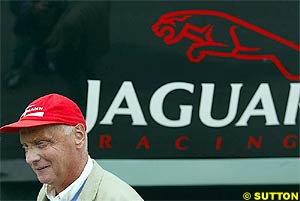 New rear uprights were added prior to the start of the season; new rear suspension and new rear uprights were again altered in mid-season; the front uprights were stiffened; the floor was redone with a new profiled diffuser; new front wing mountings, front wing main plane, front flap, new front wing endplates, new floor and diffuser and new bodywork, new barge boards and a new rear suspension set-up with new rear uprights - all were introduced at Silverstone.
New rear uprights were added prior to the start of the season; new rear suspension and new rear uprights were again altered in mid-season; the front uprights were stiffened; the floor was redone with a new profiled diffuser; new front wing mountings, front wing main plane, front flap, new front wing endplates, new floor and diffuser and new bodywork, new barge boards and a new rear suspension set-up with new rear uprights - all were introduced at Silverstone.
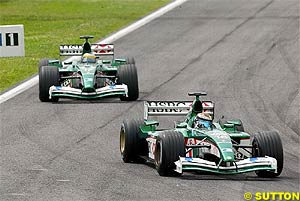 That move forward, which really ignites Lauda when he talks of the team, was somewhat hampered the last race at Indianapolis, where the team went back to qualifying at the lower end of the grid, and where the two Jaguar drivers found themselves fighting for much of the race with the Minardi drivers, at the very end of the field.
That move forward, which really ignites Lauda when he talks of the team, was somewhat hampered the last race at Indianapolis, where the team went back to qualifying at the lower end of the grid, and where the two Jaguar drivers found themselves fighting for much of the race with the Minardi drivers, at the very end of the field.
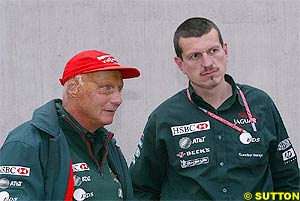 Taking over the running of the racing team, as well as retaining his other duties at PPD, meant Lauda had to put his hands into the muddy water, and deliver. However, everything about Jaguar Racing just went downhill thereafter.
Taking over the running of the racing team, as well as retaining his other duties at PPD, meant Lauda had to put his hands into the muddy water, and deliver. However, everything about Jaguar Racing just went downhill thereafter.
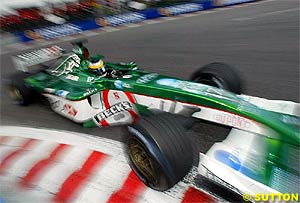 Lauda: "From my point of view - no. I had the commitment from the company. For me everything was in order, we worked normally. But there were a lot of rumours running all the time in the press, going on and on and on, and these rumours drifted away from reality. So Ford came out and said, 'hey guys - this is what it is'."
Lauda: "From my point of view - no. I had the commitment from the company. For me everything was in order, we worked normally. But there were a lot of rumours running all the time in the press, going on and on and on, and these rumours drifted away from reality. So Ford came out and said, 'hey guys - this is what it is'."
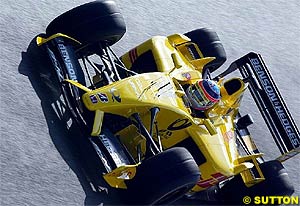 Nothing is ever simple in Formula One, and Lauda of all people should know that. In the case of the Jordan-Ford deal, Lauda could have every right to be mad at Ford for not having the courtesy to let him hear the news of yet another Ford-backed team - albeit at a smaller scale - from a different source than the paddock's media. But Lauda is a pragmatic man with a thick skin and the survivability of one who has taken part in every possible Machiavellian manoeuvre F1 had seen in its modern days.
Nothing is ever simple in Formula One, and Lauda of all people should know that. In the case of the Jordan-Ford deal, Lauda could have every right to be mad at Ford for not having the courtesy to let him hear the news of yet another Ford-backed team - albeit at a smaller scale - from a different source than the paddock's media. But Lauda is a pragmatic man with a thick skin and the survivability of one who has taken part in every possible Machiavellian manoeuvre F1 had seen in its modern days.
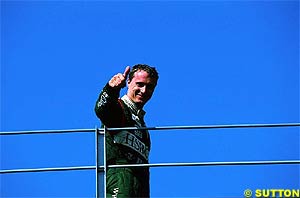 Lauda: "No, no! Going from one race to another and qualifying at the bottom of the grid - those were low points, one after the other. But if you are part of the system then you know why you are down and what you have to do to go up. It's not like an outsider who is looking at the results and feeling disappointed. You're part of it. So basically you know what the problems are so you know what you have to do to change it. It's not that bad when you're inside."
Lauda: "No, no! Going from one race to another and qualifying at the bottom of the grid - those were low points, one after the other. But if you are part of the system then you know why you are down and what you have to do to go up. It's not like an outsider who is looking at the results and feeling disappointed. You're part of it. So basically you know what the problems are so you know what you have to do to change it. It's not that bad when you're inside."
Eddie Irvine: There's a Ford in Your Future
Please Contact Us for permission to republish this or any other material from Atlas F1.
|
Volume 8, Issue 41
Atlas F1 Exclusive
Niki Lauda: No Boundaries
Renault's Off Season
Jo Ramirez: a Racing Man
Japanese GP Preview
Japanese GP Preview
Local History: Japanese GP
Japan Facts & Stats
Columns
The Japanese GP Quiz
Bookworm Critique
Rear View Mirror
Elsewhere in Racing
The Grapevine
> Homepage |